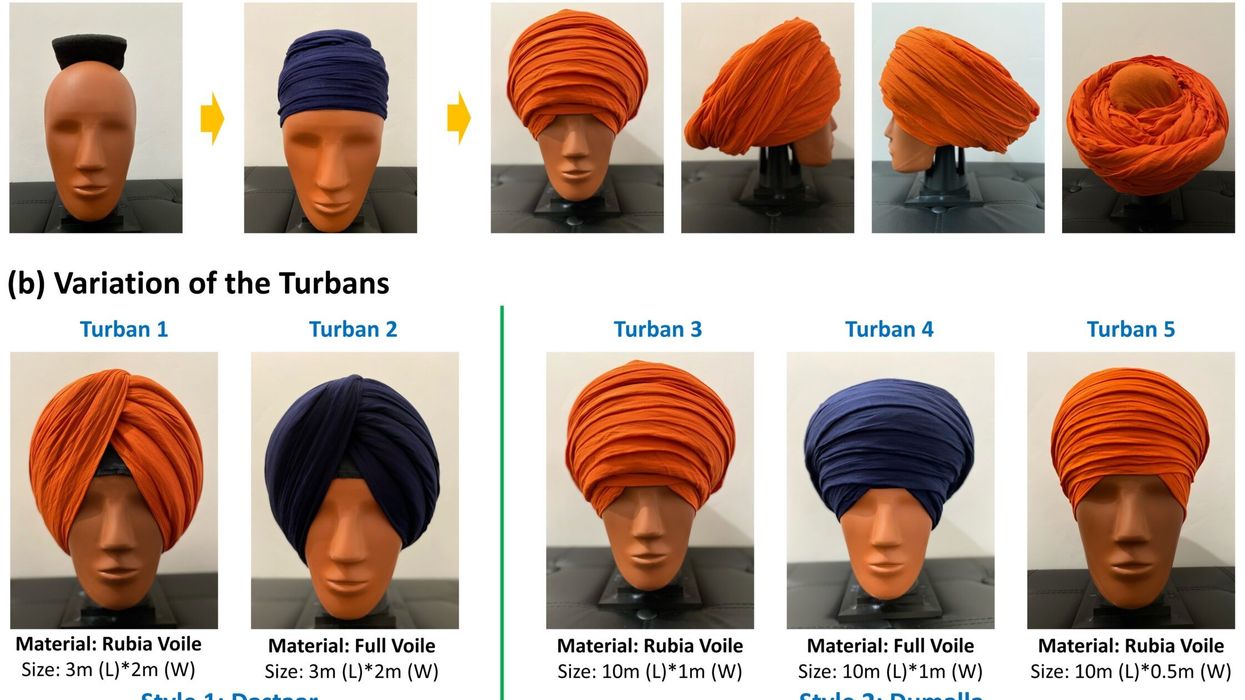MORE research is needed to develop an advanced fabric for turbans, a scientist has said, as a new study last week revealed that such headgear can greatly reduce the risk of skull fractures.
Researchers from the Imperial College, London and Sikh Scientists Network said last week that wearing Sikh turbans greatly reduced the risk of skull fractures in areas covered with a thick layer of fabric, compared to bare heads.
Dr Gurpreet Singh, from the Sikh Scientists Network and Imperial College’s department of materials, said if the head is uniformly covered with more layers of fabric, then it would offer more protection than a loosely tied turban, or the one with fewer layers.
In several countries, including the UK, India, New Zealand, Thailand and some Canadian states, Sikhs who wear turbans are legally exempt from wearing motorcycle helmets and hard hats.
Singh co-authored the study, which was published in the journal Annals of Biomedical Engineering. He told Eastern Eye, “The research should bring some relief to the Sikh community… to know that turbans, as such, have good impact-mitigating properties. If we invest to innovate around the fabric, then we can achieve a property that has potential to surpass helmets in performance as well.”
For the study, the team tested five different turbans, distinguished by two wrapping styles and two different fabrics of varied sizes. They then compared their observations of injury risk with conventional cycle helmets and with bare heads.
The research studied how turbans might mitigate impact to the head during cycling incidents. The performance of various turban styles was compared by performing crash tests on dummy heads.
They found that with respect to shocks to the front of the head, the Dastaar turban style, with three metre long and two metre wide rubia voile fabric, performed the best, by reducing the impact of the shock by 23 per cent, compared to the turban style performing the worst.
In terms of impact to the side of the head, the Dumalla turban style, with 10-metre-long and one metre wide full voile fabric, outperformed other styles by reducing the impact by 59 per cent.
Singh said, “Our findings show that simple Sikh turbans have the potential to mitigate head impacts. This provides important evidence we hope will point the wider scientific community to invest in the best headgear fabrics to absorb shock, which will open commercial markets to people from all walks of life that deal with concussions and head impacts.”
On the inspiration for his research, he said, “People often disregard religion and want scientific facts. My years of research showed that no actual tests have been done with any latest test rigs or specifications that studied impact resistance or innovation around Sikh turban fabrics.”
He hoped to develop an “impact resistance” turban fabric in two or three years, if a grant and lab facility are provided, as “material properties also inherently play a big role in mitigating forces”.
Singh told Eastern Eye, “I am interested to set up an independent lab to lead all
innovative research on various topics for the Sikhs and the world, in general.
“I know the solution is just around [the corner] as already advancements are made to produce tear-proof and bullet-proof fabrics. It is matter of just extending the knowledge to a Sikh turban fabric that is comfortable, light and washable.
“I have confidence that if I get £500,000 and a lab facility, then as a materials scientist who works with nano materials and coatings, I could create a successful prototype within two-three years.”
According to him, more research is needed to cater to minorities such as Sikhs who have specific religious requirements and who experience racial targeting because of practising their faith.
He said, “A lot of younger generation kids are now driven to follow the Sikh code of conduct, especially outside India. However, lack of a scientific thinktank for Sikhs, lack of innovation from and for our own people, and lack of Sikh scientist role models really bring dilemmas to a lot of Sikhs in the west, who have no choice but to accept societal norms and solutions.
“The lawmakers have been kind to our religious interests, and now scientific researchers need to push the front for innovating towards their equity, diversity
and inclusion (EDI) pledge.
“This study will vouch for any future studies on fabric materials for producing advanced turban materials. This serves as the best statistical front to lead on scientifically and critically empower Sikhs to keep doing good work in all fields while donning their turbans.”





